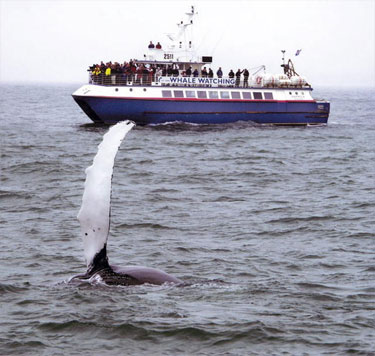“One of the biggest problems with quantum experiments is the seemingly unavoidable tendency of humans to influence the situation and velocity of small particles. This happens just by our observing the particles, and it has quantum physicists frustrated…This is the problem revealed by Heisenberg’s Uncertainty Principle. To know the velocity of a quark, we must measure it, and to measure it, we are forced to affect it. The same goes for observing an object’s position. Uncertainty about an object’s position and velocity makes it difficult for a physicist to determine much about the object” (source).
Just as the observation of subatomic particles disturbs the particles, so whale watching disturbs the animals. A recent study conducted at the University of Iceland Research Center for Marine Mammal Biology in Húsavík, northeast Iceland, indicates that minke whales change their conventional behavioral pattern when approached by whale watching boats: “According to the authors of the study…minke whales shorten their diving period considerably in the presence of boats which might impact the whales’ search for food. The authors reason that when minke whales notice boats approaching they start swimming differently than they are used to, in a more winding manner. This is to mislead whatever is following them, in this case, the whale watching boat. The shortening of the diving period may be caused by the minke whales’ increased need to surface to breathe in the presence of whale watching boats, which disturbs their search for food, the study states” (source).
On a bigger scale, “ecotourism is responsible travel to fragile, pristine, and usually protected areas that strive to be low impact and (often) small scale (as an alternative to mass tourism). Its purpose is to educate the traveler; provide funds for ecological conservation; directly benefit the economic development and political empowerment of local communities; and foster respect for different cultures and for human rights.” Unfortunately, ecotourism also disturbs the ecology being observed, often in a negative manner due to destruction of local resources to make room for ecotourism infrastructure, exploitation of local peoples for cheap labor, collection and destruction of rare species and natural resources for use as souvenirs, damaging the environment and destroying nature to make room for manmade establishments, and using wildlife as a tourist attraction, primarily to generate money for the economy, not to preserve the wildlife.
“Aside from environmental degradation with tourist infrastructure, population pressures from ecotourism also leave behind garbage and pollution associated with the Western lifestyle. Although ecotourists claim to be educationally sophisticated and environmentally concerned, they rarely understand the ecological consequences of their visits and how their day-to-day activities append physical impacts on the environment. As one scientist observes, they ‘rarely acknowledge how the meals they eat, the toilets they flush, the water they drink, and so on, are all part of broader regional economic and ecological systems they are helping to reconfigure with their very activities.’ Nor do ecotourists recognize the great consumption of non-renewable energy required to arrive at their destination, which is typically more remote than conventional tourism destinations. For instance, an exotic journey to a place 10,000 kilometers away consumes about 700 liters of fuel per person” (source).
History only existed in the human mind, subject to endless revision. “Each man kills the thing he loves”-Oscar Wilde. You kill it before it kills you, but he was wrong. You killed it by accident, thinking you were doing something else, shattering, when all you wanted to do was keep it safe — Janet Fitch (Paint It Black).
Article by Bill Norrington




